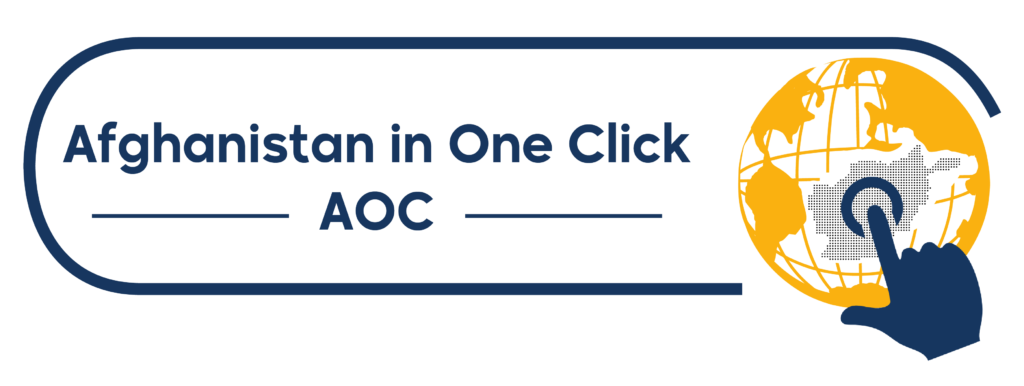Afghan Refugees Continue to Face Uncertainty

World Refugee Day arrives as thousands of Afghan refugees continue to face an uncertain and unsettled future.
These refugees are not only struggling with economic pressures and legal challenges in host countries, but recent political and security developments, especially the Iran-Israel tensions and Pakistan’s forced deportations—have further deepened the concerns.
Abdul Rauf Mohammadi, who was deported from Iran, shares his story: “On the last night when I moved, the war had already started. Israel had launched an attack. We set off and after that, we didn’t see anything else, but the conflict was raging.”
Meanwhile, the European Union Delegation in Afghanistan has once again reaffirmed its commitment to supporting Afghan refugees.
In a public statement, the delegation stated that it would continue to assist Afghan refugees, internally displaced persons (IDPs), and returnees—particularly in regional countries such as Iran, Pakistan, and Central Asia, in areas such as education, healthcare, and economic support.
A section of the EU statement reads: “Today, on World Refugee Day, the European Union renews its commitment to supporting displaced Afghans. In Afghanistan and across the region (Iran, Pakistan, and Central Asia), we support the protection, education, and livelihoods of refugees, returnees, and IDPs.”
Ali Reza Karimi, a refugee rights activist, says:
“Afghans are increasingly choosing dangerous migration routes, both legally and illegally. To reduce this trend, the government or the De facto government must seriously focus on ensuring political stability, providing security, improving the economy, expanding job opportunities, and supporting human rights.”
Political analysts and refugee rights advocates believe that close cooperation between host countries, the United Nations, and the De facto government is essential to managing the ongoing refugee crisis.
Political affairs analyst Moeen Gul Chamakni stated: “A joint committee could be formed between Afghanistan, Pakistan, and the United Nations to hold negotiations and eventually reach a solution. However, the current approach to deportations is intolerable.”
Juma Khan Pouya, an advocate for refugee rights, added: “It is crucial that host countries of Afghan refugees, including Iran and Pakistan, as well as international organizations such as UNHCR and IOM, work toward a joint solution to address the challenges facing refugees and those at risk, based on international conventions, including the Geneva Convention and its additional protocols.”
This comes as the Ministry of Refugees and Repatriations previously reported that since the return of the De facto government to power, more than 5.97 million Afghans have returned from neighboring countries.
Herat Girls Revive Ancient Miniature and Illumination Arts
 A group of young female artists in Herat are striving to preserve and expand the historical arts of miniature painting and illumination from the Herat school.
A group of young female artists in Herat are striving to preserve and expand the historical arts of miniature painting and illumination from the Herat school.
According to these girls, these delicate art forms are part of the country’s history and cultural identity, and they are committed to keeping the Herat artistic tradition alive.
After being deprived of formal education, these girls have turned to learning miniature and illumination arts. These two art forms are considered the foundational pillars of the Herat school of art.
Arezo Mohandeszada, an art student, told Media in Herat: “We want to expand and develop the ancient Herat-style arts of illumination and miniature with the cooperation of our teachers, fellow students, and colleagues.”
These arts require precision and delicacy. These young female artists work patiently for days and even weeks on each piece of their artistic creations.
Farsila Noorzai, another art student in Herat, said: “This art requires attention to fine detail and takes a lot of time, but when I work on miniature and illumination art, I never feel tired.”
Mona Ziaee is another girl determined to keep these two arts alive. She told Media: “Miniature is an art of delicacy and has a history of several hundred years. That’s why I wanted to learn it.”
Local officials in Herat pledge that they support artists to help the growth of the country’s traditional arts.
Hamidullah Ghiyasi, head of culture and arts at the Herat Department of Information and Culture, said: “The Department of Information and Culture of Herat Province, in cooperation with artists—especially in the field of illumination and miniature—and in partnership with cultural institutions and art galleries, has managed to establish strong connections.”
Miniature and illumination are considered vital parts of the Herat school of art. This school, founded by Master Kamal-ud-Din Behzad during the Timurid era, has a history of more than 600 years.
Art Exhibit in Kandahar Attracts Foreign Visitors
 An art exhibition at the Directorate of Information and Culture building in Kandahar has attracted the attention of a large number of domestic and foreign visitors.
An art exhibition at the Directorate of Information and Culture building in Kandahar has attracted the attention of a large number of domestic and foreign visitors.
According to officials, dozens of various pieces of art are displayed in this exhibition, and both domestic and foreign visitors consider the exhibited artwork valuable.
Many of the pieces on display depict civilization and history.
Alp Arslan, a tourist from Turkey who visited the exhibition, praised the skill of Kandahar’s artists. The tourist said: “I am very interested in the exhibition. I have never seen
this before. It is my first time in Kandahar and Afghanistan and I want to learn about how Afghan art.”
In addition to foreign tourists, dozens of domestic tourists and students visit the exhibition daily.
Mohammad Zahir Mubarez, a resident of Kandahar, told Media: “This exhibition has many fascinating historical, cultural, and artistic works for us to see.”
Ahmad Shah, a student in Kandahar, said about the event: “I have come here to learn about our historical sites through the art of artists, and I encourage other students and university students to visit as well.”
Meanwhile, the Directorate of Information and Culture of Kandahar said that the exhibition has attracted a large number of domestic and foreign visitors.
Abdul Jalil, the exhibition manager of the Directorate of Information and Culture of Kandahar, said: “Besides domestic and foreign tourists, students and visitors from different provinces also come to this exhibition, and recently the number of tourists has increased.”
Niyaz Mohammad Nisar, a writer, told Media: “Art is a reflection of the soul of a society, showing how strong their imagination and vision are. Therefore, this exhibition
presents a good image of literary works and intellectual creativity.”
Officials from the Directorate of Information and Culture of Kandahar also said that a fine arts group is working to further enrich Kandahar’s art exhibition.
Paktia Youth Break Tradition, Honor People During Their Lifetime
 In Paktia’s Samkani district, a group of young people organized a gathering to honor their elders, breaking the tradition of only honoring people after their death.
In Paktia’s Samkani district, a group of young people organized a gathering to honor their elders, breaking the tradition of only honoring people after their death.
The youth said that harmful traditions such as giving away of a girl or woman in marriage as blood price to settle a conflict over murder, high dowries, and other negative customs still exist in society and must be ended.
Amir Arian, a resident of Samkani district, said: “The purpose of this gathering and festival was to eliminate harmful traditions so that our elders and youth can live honorably, to end the practice of honoring people only after their death, and to respect them while they are alive.”
Another resident, Bahram Afghan, said: “Among the harmful traditions are giving girls to settle disputes and marriages without the consent of girls and boys, some of these practices have been reduced, but some still remain.”
The youth and residents of Samkani district said they feel joy in honoring people during their lifetime and believe that following the example of their elders is the key to success.
Abdul Basir Pardes, another resident of Chamkani, said: “We respect our elders because they are experienced. Experience comes with age, and their deeds are recorded in history. We should avoid bad practices and follow the path of our elders.”
Tribal elder Bakhtar Gul Rahimi said: “In every matter, we must consult our elders because they know the outcomes and are aware of history. It’s like building a canal — consultations with elders are necessary.”
Tribal unions and councils in Paktia are seen as influential in resolving social issues.
Historic Begum Minaret in Ghazni at Risk of Collapse: Residents
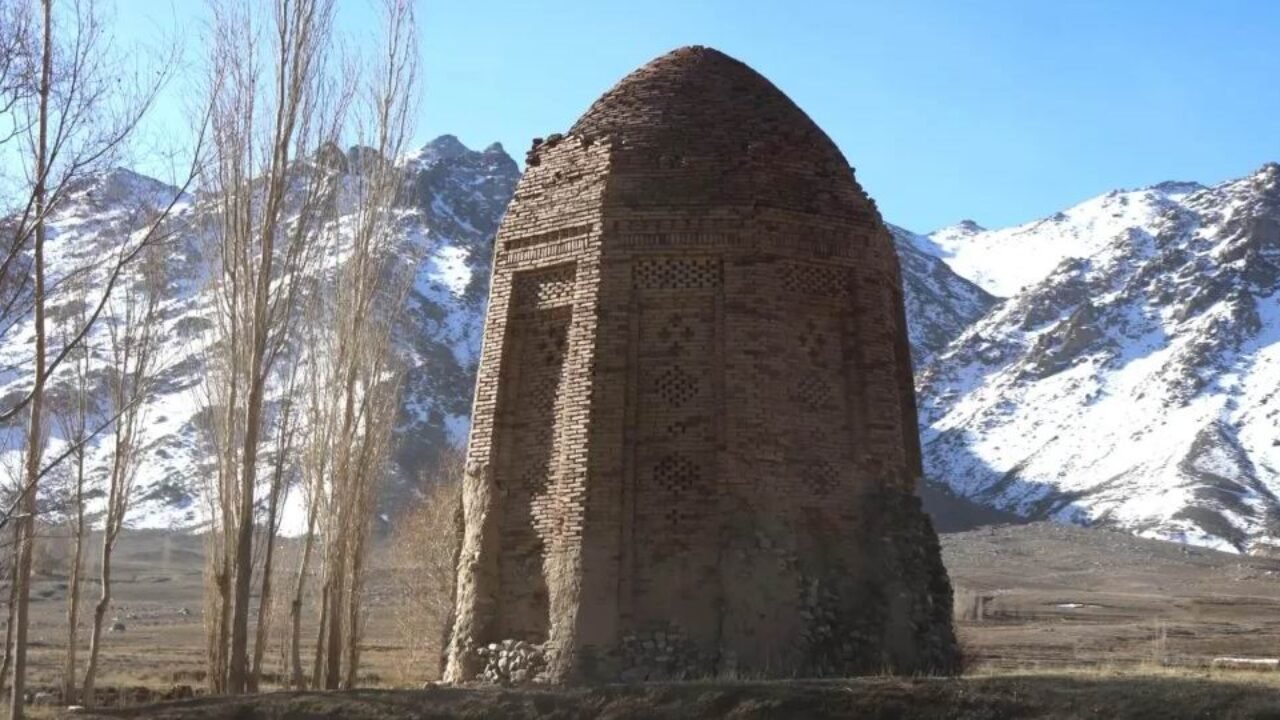 Residents and cultural activists in Ghazni province say the historic Begum Minaret in Jaghatu district is at risk of collapse.
Residents and cultural activists in Ghazni province say the historic Begum Minaret in Jaghatu district is at risk of collapse.
They warn that if urgent restoration efforts are not undertaken, the minaret, which has a history spanning around 1,000 years, could completely collapse. The structure has already suffered significant damage due to natural disasters and a lack of attention from authorities.
Agha Mohammad Khoshizada, a cultural activist in Ghazni, told Media: “The Begum Minaret holds both historical and cultural value, but due to the negligence of successive governments, it is now under serious threat. Without immediate restoration efforts, it will be entirely destroyed.”
Another cultural activist, Ahmad Shah, said: “The De facto government should focus on restoring this ancient monument. Sometimes tourists come here and ask why it hasn’t been restored, but we can do nothing, it is the government’s responsibility.”
Ali Mohammad, a resident of Jaghatu district, said: “Our demand is that this historical monument be restored before it completely deteriorates.”
Local officials in Ghazni say they have shared the issue with the Ministry of Information and Culture and some cultural organizations, and restoration work is expected to begin soon.
Hamidullah Nisar, the head of Ghazni’s Information and Culture Department, said: “The ministry has given us assurances, and we have discussed it with several organizations. We are working to begin the restoration of the Begum Minaret as soon as possible.”
According to Ghazni’s Information and Culture Department, besides the Begum Minaret, eight other historical sites in the province also need restoration. Plans have already been approved for the restoration of Sardar Tapa and Sultan Shahabuddin Ghori’s Mausoleum, and practical work will start soon.
UN Urges Global Action to Combat Malnutrition in Afghanistan
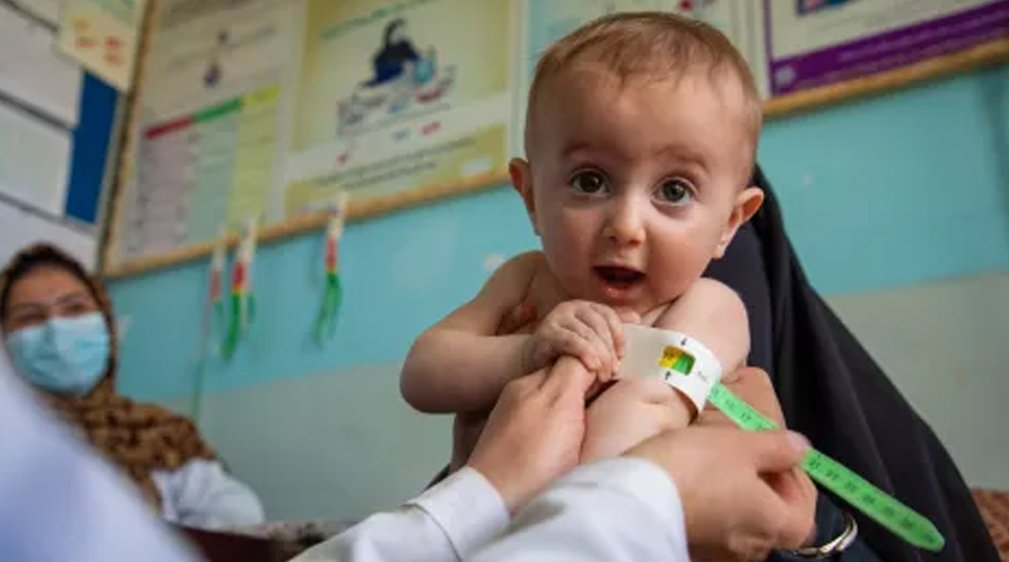 The World Food Programme (WFP), UNICEF, UNFPA, the Food and Agriculture Organization (FAO), and the World Health Organization (WHO) have issued a joint call for urgent, coordinated global action to address a worsening malnutrition crisis in Afghanistan, particularly among children and women.
The World Food Programme (WFP), UNICEF, UNFPA, the Food and Agriculture Organization (FAO), and the World Health Organization (WHO) have issued a joint call for urgent, coordinated global action to address a worsening malnutrition crisis in Afghanistan, particularly among children and women.
The statement warns that Afghanistan is among the 15 countries with the highest rates of “child wasting.” Over 3.5 million children under five are acutely malnourished, including 1.4 million suffering from life-threatening conditions. Additionally, four in every ten women are undernourished.
This crisis is driven by severe food insecurity caused by economic instability and environmental disasters like drought. Around 9.8 million people face acute food shortages, and 2.1 million young children live in child food poverty, lacking access to a diverse and nutritious diet.
The statement quotes Kwabena Asante-Ntiamoah, UNFPA Representative in Afghanistan, as saying: “Good maternal nutrition is crucial for maternal health and the survival of newborns in Afghanistan, where many women start pregnancy undernourished. Poor maternal nutrition not only increases the risk of maternal mortality but also contributes to low birthweight, stunted growth, and poor developmental outcomes for children.”
The UN emphasized the need for global support across food, health, water, education, and social services to both prevent and treat malnutrition.
UNICEF’s Representative, Tajudeen Oyewale, called the crisis a “test of global commitment,” emphasizing that “millions of children are suffering from life-threatening malnutrition due to poor services and food poverty. Investing in nutrition today is an investment in peace, resilience, and the future of Afghanistan.”
Previously, the World Food Programme predicted that by 2025, 3.5 million children in Afghanistan would suffer from malnutrition.
The agency also reported that 1.2 million pregnant and breastfeeding women in the country are currently affected by malnutrition and urgently need nutritional treatment and support.
Polio Budget Cuts and New Cases Spark Global Health Concerns
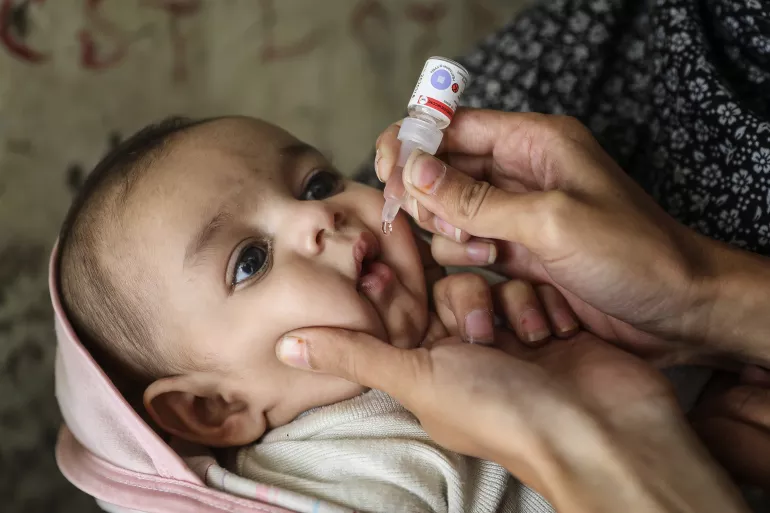 Hanan Balkhy, Regional Director of the World Health Organization (WHO) for the Eastern Mediterranean, has said that in 2026, the polio eradication program will face a 40% budget cut.
Hanan Balkhy, Regional Director of the World Health Organization (WHO) for the Eastern Mediterranean, has said that in 2026, the polio eradication program will face a 40% budget cut.
The Health Policy Watch has reported that this budget reduction comes at a time when polio cases have increased in Afghanistan and Pakistan.
Hanan Balkhy warned that if investment is not made in this area, polio could once again spread across the globe.
“We are at a tipping point. Either we invest now to finish the job or risk a global resurgence,” she said.
Speaking at the World Health Assembly in Geneva, Hanan Balkhy said that at the beginning of 2024, the poliovirus was nearly eliminated in Afghanistan and Pakistan, but according to her, new cases in Somalia, Sudan, Yemen, and Gaza have worsened the situation.
The Global Polio Eradication Initiative began in 1988, with an initial target to eradicate the virus by 2000. However, due to delays and the virus not being fully controlled, the deadline has now been extended to 2029.
The World Health Organization had requested a budget of $6.9 billion for this program, but so far, only $4.6 billion has been secured.
The program’s budget has been reduced significantly due to the withdrawal of U.S. support from WHO.
The 78th World Health Assembly in Geneva, held under the theme “One World for Health,” began on May 19 and will continue until May 27.
Sharp Rise in Infectious Diseases Reported Across Afghanistan in last months
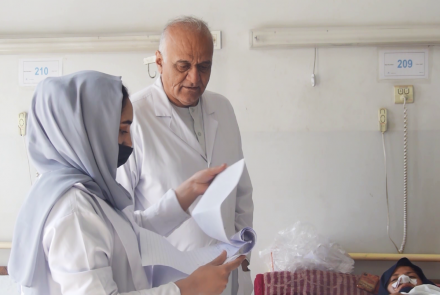 The World Health Organization (WHO) has reported a significant increase in the number of infectious diseases in Afghanistan during the month of May compared to April.
The World Health Organization (WHO) has reported a significant increase in the number of infectious diseases in Afghanistan during the month of May compared to April.
According to the report, 200 people were infected with the Crimean-Congo hemorrhagic fever (CCHF) in May, and 16 of them died. During the same period, 586 people tested positive for COVID-19, though no fatalities were recorded.
Similarly, 5,136 people contracted malaria, 216 were infected with dengue fever, 15,759 with acute diarrhea, 14,660 with measles, and 92,866 people suffered from pneumonia. Six deaths were attributed to diarrhea, 93 to measles, and 195 people lost their lives due to pneumonia.
Doctors believe that, among other factors, the closure of health centers due to the suspension of aid has contributed to the increase in disease cases.
Dr. Ikramuddin Nezami told Media: “With the suspension of these aid programs, people in many remote districts no longer have access to healthcare services, and this issue has already had and will continue to have a direct impact on the people.”
Another physician, Ahmad Shaqib Zaheer, stated: “Other international organizations can assist in strengthening the economic and social conditions of our society, and they can also take steps to deliver global aid to different regions of the country.”
Earlier this year, the WHO already reported the closure of several health centers under its support. However, in its latest report, the organization stated that it still supports 131 primary health centers across 20 provinces.
Afghanistan Reaches Self-Sufficiency in Honey Production
 The Beekeepers Union said Afghanistan has now reached self-sufficiency in honey production.
The Beekeepers Union said Afghanistan has now reached self-sufficiency in honey production.
During a meeting held in Paktia province, members of the union called on the caretaker government to facilitate marketing for Afghan honey and provide the necessary support to increase production.
According to the union, there are currently 8,000 beekeeping farms operating across the country.
Shah Jahan Mubarez, head of the Beekeepers Union, said: “If we stop importing foreign honey, God willing, Afghanistan is self-sufficient in this sector. The reason foreign honey imports have not been stopped is that we haven’t reported this issue to the government.”
Other union members also stressed the need for market access, the promotion and maintenance of effective plants, and other necessary facilities.
Aqlbaz Selab, a member of the Beekeepers Union in Nangarhar, said during the Paktia meeting: “We need a strong honey market in Kabul, and each province should have its own market so that shops can be organized into central areas rather than being scattered in alleys. This will bring order and prevent price fluctuations.”
“Honey from Iran, Pakistan, and other countries is widely available in Afghanistan, and the presence of foreign honey has weakened the market for our local products,” said Mohammad Yousuf, a union member from Logar.
However, local officials in Paktia have assured beekeepers that their challenges will be addressed.
Mohammad Azim Azimi, head of Industry and Commerce in Paktia, stated: “Any responsibility related to us—whether in honey production or other sectors—we are committed to fulfilling it.”
According to statistics from the Department of Agriculture and Irrigation in Paktia, the province has 276 beekeeping farms, which produced 250 tons of honey last solar year.
Panjshir Cherries to Be Exported Central Asia
 Local officials in Panjshir have announced that around 100 tons of cherry products from the province will be exported to several Central Asian countries.
Local officials in Panjshir have announced that around 100 tons of cherry products from the province will be exported to several Central Asian countries.
According to officials, traders from Uzbekistan and Kyrgyzstan plan not only to purchase cherries but also to buy apples and grapes to export to Central Asian countries.
Previously, cherry products from Panjshir and other provinces were exported to India and Pakistan. However, according to Panjshir’s local authorities, these exports have been suspended this year for various reasons.
Aminul Haq Masouri, head of Industry and Commerce in Panjshir, stated: “Last year, cherries were exported to India, but this year, due to tensions between India and Pakistan, the export market has stagnated. Panjshir’s apples, apricots, and grapes also have high quality.”
Two traders from Uzbekistan and Kyrgyzstan have visited Afghanistan and, in meetings with Panjshir’s local officials, stated that they plan to purchase around 100 tons of cherry products from the province and export them to some Central Asian countries. These traders also mentioned that, in addition to cherries, they would buy apples and grapes for export to Central Asia.
Haji Zahid, a Kyrgyz trader, said: “We will not only purchase Panjshir’s cherries but also grapes, apples, and pomegranates, possibly from Panjshir or other provinces, and export them to Uzbekistan, Kyrgyzstan, and other countries.”
Abdul Basit, a resident of Panjshir, commented on the export of cherries: “In the past, cherries were not sold at high prices, but fortunately now, foreign buyers are coming and exporting cherries out of Afghanistan, which has fortunately improved the markets.”
Meanwhile, according to Panjshir’s local authorities, some orchard owners in the province earned over 360 million afghani last year from the sale of cherry products.
Uzbekistan’s Foreign Minister Stresses Importance of Trans-Afghan Project
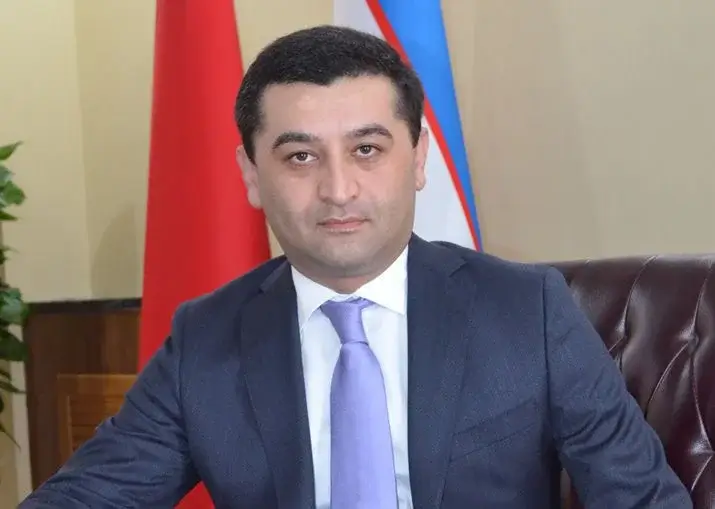 Uzbekistan’s foreign minister emphasized the importance of the Trans-Afghan project for regional connectivity during the India-Central Asia Business Council meeting in New Delhi.
Uzbekistan’s foreign minister emphasized the importance of the Trans-Afghan project for regional connectivity during the India-Central Asia Business Council meeting in New Delhi.
Bakhtiyor Saidov said that this corridor could become the shortest transport route between Central and South Asia and pave the way for expanded regional trade and economic exchanges.
He also called on India to participate in transport projects connecting Central and South Asia.
Bakhtiyor Saidov said: “The Trans-Afghan Corridor offers us significant capacity by providing direct access to the Indian Ocean. Expanding this route and linking it with other regional corridors can quickly establish transportation connectivity and promote trade and economic growth.”
According to Afghanistan’s Ministry of Public Works, the project spans 573 kilometers across Afghanistan, and the De facto government is committed to its implementation.
Mohammad Ashraf Haqshenas, spokesperson for the Ministry of Public Works, said: “As an active member in this project, the Ministry of Public Works of the De facto government has previously participated in meetings with different countries to advance this project and will continue to participate in such meetings in the future.”
Economic analyst Mir Shakir Yaqubi said: “The Trans-Afghan project enhances Afghanistan’s economic significance in the region compared to the past and strengthens economic and trade ties with neighboring countries. It also reduces Afghanistan’s dependence on a few limited ports and facilitates access to major global markets and ports.”
The project aims to connect Central and South Asia and other regions of the world through the transportation of goods. The cost is estimated between $4.8 billion and $7 billion, and it is expected to be completed by 2027.
Nuristan’s Precious Stones Sold for Over 42 Million Afghani
 The Ministry of Mines and Petroleum said that in the bidding process for the sale of precious and semi-precious stones from Nuristan, kunzite and beryl stones from the Mawi mine in Du Ab district were sold for over 42 million afghani.
The Ministry of Mines and Petroleum said that in the bidding process for the sale of precious and semi-precious stones from Nuristan, kunzite and beryl stones from the Mawi mine in Du Ab district were sold for over 42 million afghani.
According to the ministry’s press release, the de facto government’s share from this bidding amounted to over 4.281 million afghani.
The kunzite and beryl stones from the Mawi mine were sold for a total of 42,814,500 afghani.
Qutbuddin Yaqubi, an economic affairs expert, told: “Extraction, processing, and packaging should be done in the way the world expects. If we do not properly extract, process, and package these highly valuable gems, I am certain the world will not be interested in buying such stones.”
Other experts, highlighting the importance of Afghanistan’s precious and semi-precious stones, emphasized the need to establish processing factories within the country.
Ahmad Firdaws Behgozin, another economic expert, told ws: “Laws that help improve the extraction of Afghanistan’s minerals should be enacted, and serious monitoring should be conducted to prevent illegal extraction and smuggling so that we can witness positive changes in this sector.”
It is worth mentioning that Afghanistan’s precious and semi-precious stones are internationally renowned for their high quality, and recently, some foreign investors have also shown interest in investing in this sector.
Afghanistan Reaches Self-Sufficiency in 130 Sectors, Says Economic Deputy
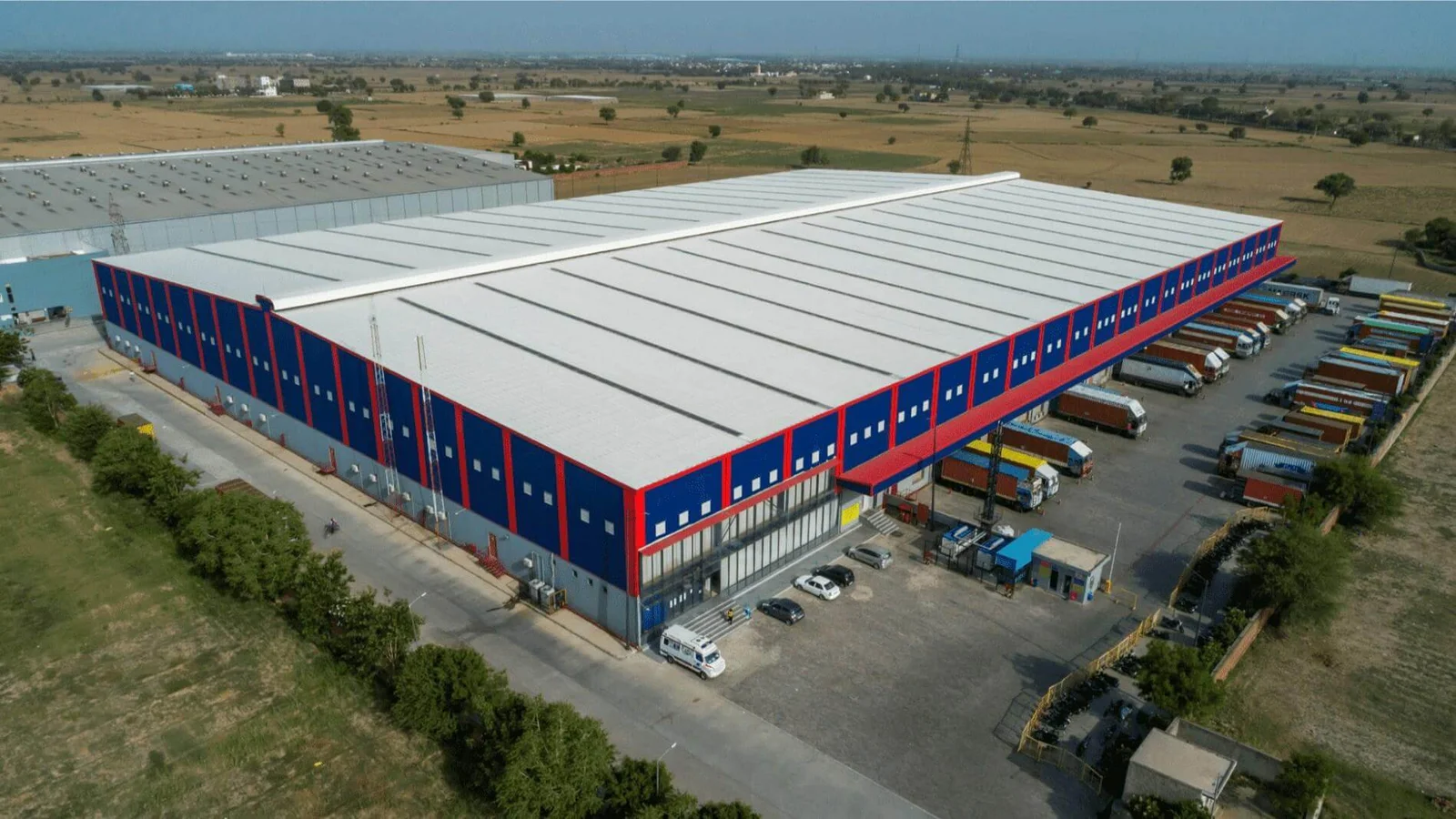 The Economic Deputy Office of the Prime Minister announced that Afghanistan has achieved full self-sufficiency in 130 sectors, and partial self-sufficiency in another 100 sectors.
The Economic Deputy Office of the Prime Minister announced that Afghanistan has achieved full self-sufficiency in 130 sectors, and partial self-sufficiency in another 100 sectors.
It also stated that six thousand industrial factories across the country have created job opportunities for 135,000 people.
These factories produce 570 types of goods, including flour, salt, oil, medicine, iron, cement, steel, and chemical products.
Hamdullah Fitrat, deputy spokesperson of the Islamic Emirate, said: “These factories produce 570 types of goods such as flour, oil, salt, medicine, iron, cement, steel, and chemical products, and they have provided direct employment for 135,000 people.”
Meanwhile, some economic experts believe that for rapid industrial growth, attention must be paid to key factors such as imposing tariffs on similar imported goods, ensuring energy and raw material supply, and supporting exports.
Abdul Nasir Reshtia, an economic expert, said: “The government has a responsibility to facilitate production factors for attracting investment and developing domestic industries. These factors include land, energy, and access to finance. If the government can implement these policies, there is no doubt we will see increased exports and more job opportunities.”
Qutbuddin Yaqubi, another economic expert, said: “To strengthen this sector, there must be greater use of domestically produced goods, more incentives for investors, and expanded opportunities. In addition, marketing channels for domestic products, both inside and outside the country, should be created.”
The economic deputy emphasized that the De facto government has taken steps to support the industrial sector, including land distribution, lowering customs tariffs, curbing smuggling, and organizing trade exhibitions.
DAB announces expansion of banking relations with Afghan US Chamber of Commerce
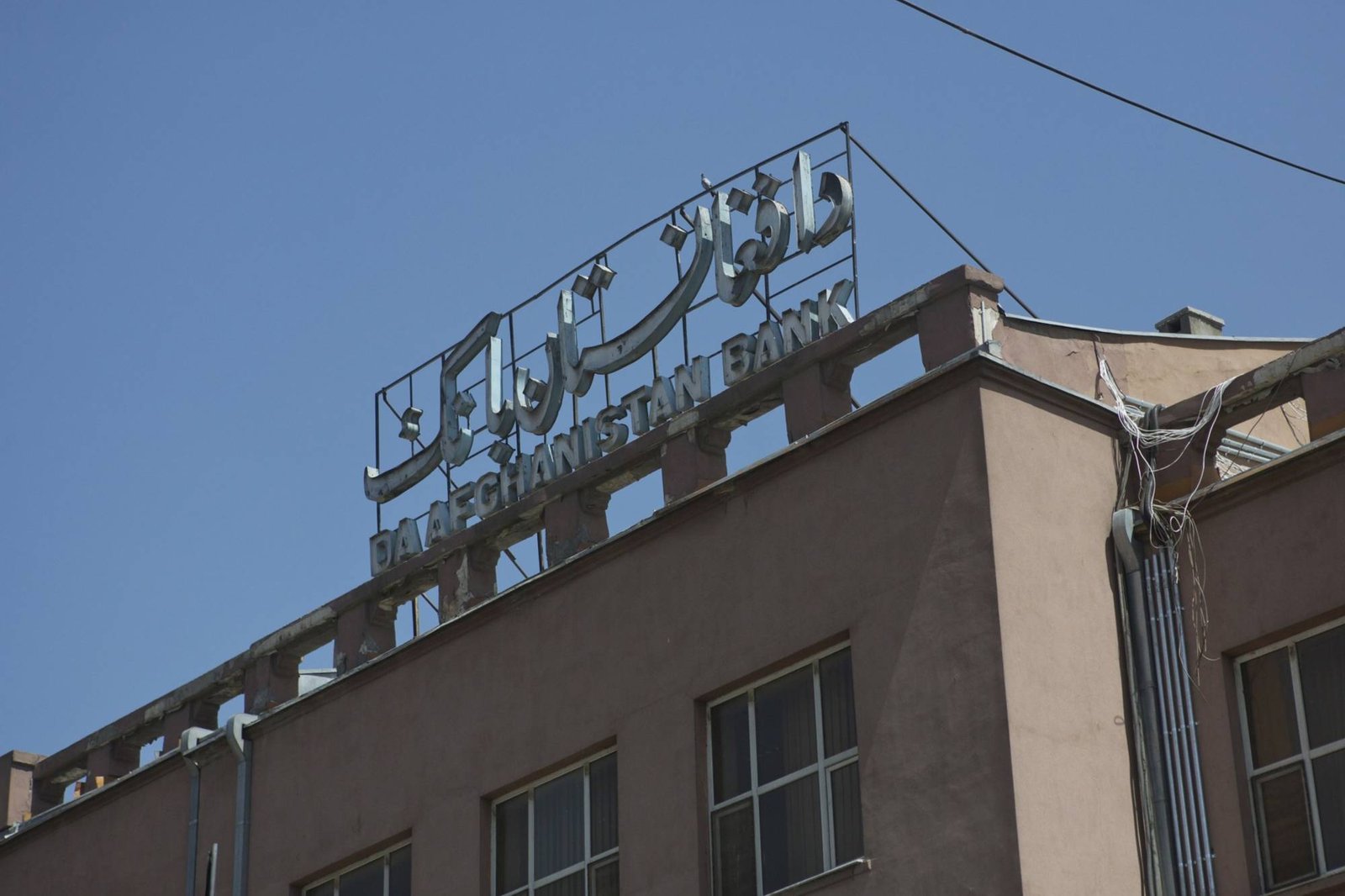
First Deputy Governor of Da Afghanistan Bank, Sediqullah Khalid, on Saturday met with Jeffrey Grieco, President of the Afghanistan-US Chamber of Commerce, and discussed strengthening the private sector, increasing trade, expanding mutual banking relations, and fostering joint cooperation, DAB said in a statement.
During the meeting, DAB quoted Grieco, who stated that over the past three years, he has witnessed positive changes in Afghanistan’s economic and banking sectors.
He also announced the organization of a conference in August of this year aimed at expanding banking relations and invited DAB to participate and speak at the event.
In the meeting, Khalid emphasized the importance of the banking and financial sectors in the country’s economic growth and affirmed that DAB is committed to making every effort towards the nation’s economic development.
He assured that the bank is strengthening anti-money laundering programs, mechanisms for regulating currency exchangers and money service providers, and ensuring inflation remains at acceptable levels.
He added that in the past three years, Afghanistan’s banking sector has made significant progress in mutual banking relations, with financial transactions to the public increasing by 71 percent compared to last year.
According to Khalid, in just the past three months, the banking sector’s deposits have risen by 7.9 billion afghanis, and a large portion of issues related to international money transfers have been resolved.
Afghan Wrestling Team Shines with Gold, Silver and Bronze in Uzbekistan
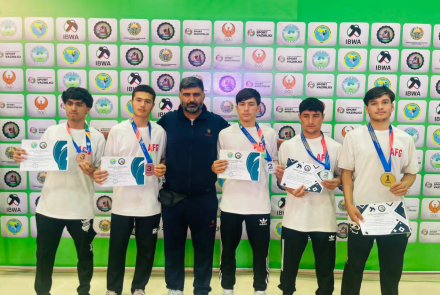 Afghanistan’s national Rustami wrestling team concluded their participation in the World Wrestling Championships and Asian Under-18 Youth Wrestling Competitions in Uzbekistan with five medals: one gold, two silver, and two bronze.
Afghanistan’s national Rustami wrestling team concluded their participation in the World Wrestling Championships and Asian Under-18 Youth Wrestling Competitions in Uzbekistan with five medals: one gold, two silver, and two bronze.
In these competitions, Mohammad Omar Azizi won a gold medal. Jawid Karimi and Mohammad Sakhi Zada each secured silver medals and were recognized as runners-up in the 77 kg and 65 kg weight categories respectively. Bilal Rahmani claimed a bronze medal in the 71 kg category.
Mohammad Munir Nabizada also earned third place and won a bronze medal.
The World Wrestling Championships and the Asian U18 Youth Wrestling Competitions in the “Bilbaghli Kurash” style were hosted by Uzbekistan.
A delegation of around twenty people, including three international referees, represented Afghanistan in these competitions.
Afghanistan Drawn with Myanmar and Maldives in 2026 Futsal Qualifiers
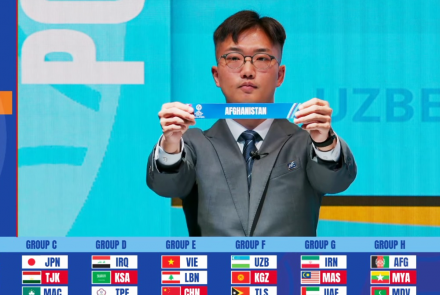 Afghanistan’s national futsal team has been placed in the same group as Myanmar and the Maldives for the qualifying stage of the 2026 AFC Futsal Asian Cup.
Afghanistan’s national futsal team has been placed in the same group as Myanmar and the Maldives for the qualifying stage of the 2026 AFC Futsal Asian Cup.
The draw ceremony took place today (Thursday) in Kuala Lumpur, Malaysia, involving 31 participating teams. Afghanistan was drawn into Group H alongside Myanmar and the Maldives.
The qualifiers will begin in September this year, with Myanmar hosting the Group H matches.
Mustafa Hashemi, spokesperson for the Afghanistan Football Federation, told Media that the national futsal team is facing relatively less competitive opponents in this round and is expected to perform well in the group.
Last year, Afghanistan’s futsal team participated in the AFC Futsal Asian Cup but was eliminated in the knockout stage by Tajikistan.
It’s also worth noting that last year marked Afghanistan’s debut appearance in the Futsal World Cup, hosted in Uzbekistan.
Subscribe Now
Don’t miss our future updates! Get Subscribed Today!
© 2025 White Assembly. All Rights Reserved.
